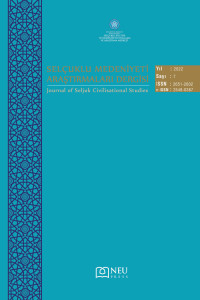Öz
Kabul edilir ki, felsefenin değeri, sorunları görmek ve bu sorunlar için genel-geçer çözümler sunmak peşinde olmasıdır. Bu, ilimlerin sınıflandırılması örnekleri için de geçerlidir ve bu konuda esas olan “perspektif”tir ve bu perspektifin sorunun çözümü için sunduğu yaklaşımın genelliğidir. Dolayısıyla bu açıdan bakılırsa ve belli bir zaman ve mekânda üretilmiş/keşfedilmiş düşünceyi ve tecrübeyi birebir aktarmanın imkansızlığı da göz önüne alınırsa, tümel, sistemli, rasyonel, gerekçelendirilmeye çalışılmış, belli bir perspektife dayalı ve belli bir amaca matuf felsefi düşüncelerin aktüel değeri, felsefi mirasın bizim için teorik ve pratik yararı daha iyi anlaşılacaktır. İlimler sınıflandırılması ile ilgili birikim de böyledir. Burada görüşlerini ele almaya çalıştığımız Fârâbî, İslam felsefesinde ilimler sınıflandırması alanında kapsamlı ve sistematik bir düşünce ortaya koyan ve bu konuda İhsau’l-ulûm (İlimlerin Sayımı) adlı müstakil bir eser de yazan ilk İslâm filozofudur. Filozof bu konuya o kadar önem vermiştir ki, adını andığımız eseri yanında daha başka eserlerinde de konuya geniş oranda yer vermiştir. Öyle görülüyor ki, Fârâbî’nin ilimleri sınıflandırması, belli bir dünya görüşüne, belli bir bakış açısına ve belli bir pedagojiye dayanmakta ve belli bir amacı gerçekleştirme arzusuna dönük gözükmektedir. İşte burada biz, Fârâbî’nin çokça işlenmiş bu konudaki görüşlerini yeniden gündeme getirerek ve ilim, din ve felsefe hakkındaki görüşleri de göz önüne alınarak bugüne de ışık tutabilecek birtakım ufuklara sahip olup olmadığına bakmaya çalışacağız.
Kaynakça
- Arslan, Ahmet. “Çevirenin Önsözü”, İlimlerin Sayımı (İhsâü’l-ulûm) içinde. çev. A. Arslan. Ankara: Divan Kitap, 3. Baskı, 2011.
- Bakar, Osman. İslam Düşüncesinde Bilimler Tasnifi. çev. Erhan Güngör. İstanbul: İnsan Yayınları, 2012.
- Bircan, Hasan Hüseyin. İslam Felsefesinde Mutluluk. Konya: Çizgi Kitabevi Yayınları, 2020.
- Fârâbî, Ebû Nasr. Kitâbü’l-mille. (Fârâbî’nin Kitâbü’l-Mille Adlı Eserinin Takdim ve Çevirisi). çev. Fatih Toktaş. Dîvân 2002/1.
- Fârâbî, Ebû Nasr. es-Siyâsetü’l-medeniyye. çev. Mehmet Aydın, Abdulkadir Şener, M. Rami Ayas. İstanbul: Kültür Bakanlığı Yayınları, 1980.
- Fârâbî, Ebû Nasr. İdeal Devlet (el-Medînetü’l-fâzılâ). çev. Ahmet Arslan. İstanbul: Divan Kitap, 5. Baskı, 2013.
- Fârâbî, Ebû Nasr. İlimlerin Sayımı (İhsâü’l-ulûm), çev. Ahmet Arslan. Ankara: Divan Kitap, 3. Baskı, 2011.
- Fârâbî, Ebû Nasr. Kitâbü’l-burhân. çev. Ömer Türker - Ömer Mahir Alper. İstanbul: Klasik Yayınları, 2008.
- Fârâbî, Ebû Nasr. Mutluluk Yoluna Yöneltme (Tenbîh alâ sebîli’s-saade). çev. Hanifi Özcan. İzmir: Anadolu Matbaacılık, 1993.
- Fârâbî, Ebû Nasr.Mutluluğun Kazanılması (Tahsîlü’s-saade). çev. Ahmet Arslan. İstanbul: Divan Kitap, 2. Baskı, 2012.
- Fârâbî, Ebû Nasr. “Astroloji Hakkındaki Doğru ve Yanlış Bilgiler”. çev. Mahmut Kaya. İslam Filozoflarından Felsefe Metinleri içinde, İstanbul: Klasik Yayınları 2003.
- Korkut, Şenol. “Fârâbî’nin Felsefî Sisteminde İlm-i Medenî, Kelâm ve Fıkıh İlişkisi”. Eskiyeni 28 (Bahar 2014), 97-136.
- Kutluer, İlhan. İslam’ın Klasik Çağında Felsefe Tasavvuru. İstanbul: İz Yayınları, 1. Baskı, 1996.
- Özturan, Hümeyra. “Fârâbî ve İbn Sînâ’da Amelî Felsefe: Bir Mukayese”. Nazariyat Dergisi 5/1 (Nisan 2019), 1-36.
- Toktaş, Fatih. “Fârâbî’nin Kitâbü’l-Mille Adlı Eserinin Takdim ve Çevirisi”. Dîvân 2002/1, 247-273.
Öz
Admittedly, the value of philosophy is that it pursues finding the problems and offering universal solutions. That applies to the examples of classification of sciences and “perspective” matters in this subject, especially the general aspects of that perspective which offers a solution to the problem is essential. Thereby, the actual value of universal, systematic, rational, justified, perspective-based and purposeful philosophical thoughts; and the theoretical and practical benefit of philosophical heritage for us is better understood considering the impossibility of the direct transmission of thoughts and experiences which are produced/discovered in the particular time and space. This is also the case with the classification of sciences. Al-Fārābī, whose thoughts we are focusing on in this article, is the first Islamic philosopher who extensively worked on the classification of sciences in the philosophy of Islam. As a systematic thinker, Al-Fārābī wrote İhsau’l-ulûm (Enumeration of the Sciences) on this subject. However, the philosopher’s contribution to the subject is not limited to that above-mentioned book, he wrote on this matter extensively in his other works. It suggests that Al- Fārābī’s classification of sciences rests upon a specific worldview and perspective besides a specific pedagogy, moreover, it seems to be driven by the desire to realise a specific aim. Al-Fārābī’s thoughts on this subject have been widely studied before, in this paper we revive his thoughts on science, religion and philosophy while seeking to see whether there are any horizons in his philosophy that could shed light on our days.
Anahtar Kelimeler
Kaynakça
- Arslan, Ahmet. “Çevirenin Önsözü”, İlimlerin Sayımı (İhsâü’l-ulûm) içinde. çev. A. Arslan. Ankara: Divan Kitap, 3. Baskı, 2011.
- Bakar, Osman. İslam Düşüncesinde Bilimler Tasnifi. çev. Erhan Güngör. İstanbul: İnsan Yayınları, 2012.
- Bircan, Hasan Hüseyin. İslam Felsefesinde Mutluluk. Konya: Çizgi Kitabevi Yayınları, 2020.
- Fârâbî, Ebû Nasr. Kitâbü’l-mille. (Fârâbî’nin Kitâbü’l-Mille Adlı Eserinin Takdim ve Çevirisi). çev. Fatih Toktaş. Dîvân 2002/1.
- Fârâbî, Ebû Nasr. es-Siyâsetü’l-medeniyye. çev. Mehmet Aydın, Abdulkadir Şener, M. Rami Ayas. İstanbul: Kültür Bakanlığı Yayınları, 1980.
- Fârâbî, Ebû Nasr. İdeal Devlet (el-Medînetü’l-fâzılâ). çev. Ahmet Arslan. İstanbul: Divan Kitap, 5. Baskı, 2013.
- Fârâbî, Ebû Nasr. İlimlerin Sayımı (İhsâü’l-ulûm), çev. Ahmet Arslan. Ankara: Divan Kitap, 3. Baskı, 2011.
- Fârâbî, Ebû Nasr. Kitâbü’l-burhân. çev. Ömer Türker - Ömer Mahir Alper. İstanbul: Klasik Yayınları, 2008.
- Fârâbî, Ebû Nasr. Mutluluk Yoluna Yöneltme (Tenbîh alâ sebîli’s-saade). çev. Hanifi Özcan. İzmir: Anadolu Matbaacılık, 1993.
- Fârâbî, Ebû Nasr.Mutluluğun Kazanılması (Tahsîlü’s-saade). çev. Ahmet Arslan. İstanbul: Divan Kitap, 2. Baskı, 2012.
- Fârâbî, Ebû Nasr. “Astroloji Hakkındaki Doğru ve Yanlış Bilgiler”. çev. Mahmut Kaya. İslam Filozoflarından Felsefe Metinleri içinde, İstanbul: Klasik Yayınları 2003.
- Korkut, Şenol. “Fârâbî’nin Felsefî Sisteminde İlm-i Medenî, Kelâm ve Fıkıh İlişkisi”. Eskiyeni 28 (Bahar 2014), 97-136.
- Kutluer, İlhan. İslam’ın Klasik Çağında Felsefe Tasavvuru. İstanbul: İz Yayınları, 1. Baskı, 1996.
- Özturan, Hümeyra. “Fârâbî ve İbn Sînâ’da Amelî Felsefe: Bir Mukayese”. Nazariyat Dergisi 5/1 (Nisan 2019), 1-36.
- Toktaş, Fatih. “Fârâbî’nin Kitâbü’l-Mille Adlı Eserinin Takdim ve Çevirisi”. Dîvân 2002/1, 247-273.
Ayrıntılar
| Birincil Dil | Türkçe |
|---|---|
| Bölüm | Araştırma Makaleleri |
| Yazarlar | |
| Erken Görünüm Tarihi | 29 Aralık 2022 |
| Yayımlanma Tarihi | 31 Aralık 2022 |
| Gönderilme Tarihi | 13 Eylül 2022 |
| Yayımlandığı Sayı | Yıl 2022 Sayı: 7 |
Kaynak Göster


